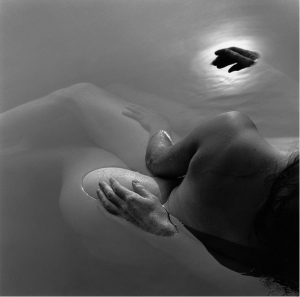
Karin Rosenthal, Floating Hands, 1995
In precedenza: (1) Quando la mano si fa voce (2) La carezza è risveglio dei sensi – (3) Non sempre le parole riescono a raggiungerci – (4) Per il bambino la carezza è formazione – (5) Il nostro Io pensante emerge attraverso la pelle – (6) La carezza ci conduce all’idea dell’infinito – (7) La carezza è apertura mentale alle singolarità dell’altro – (8) La carezza è memoria impressa nel tempo.A seguire: (10) La metafora della carezza costruisce la pace – (11) Senza carezze viene meno la speranza – (12) La carezza lotta contro l’indifferenza.
La vera carezza nasce d’impulso ma spesso viene trattenuta per paura di essere fraintesa, qualche volta rimpiazzata da un sorriso che non è altro che una carezza dell’anima. La carezza trattenuta ci fa pensare che in questa società che si vuole perfetta e ben allineata si siano perse alcune sensazioni, e tra queste il calore umano: siamo tutti più diffidenti, più sospettosi verso chi abbiamo vicino, siamo più freddi, più composti in tutto ciò che facciamo, abbiamo perso la gioia del contatto con l’altro, cosa che invece in altre culture più povere e meno civilizzate è molto più forte e naturale.
Nella società attuale cerchiamo sempre più di incanalare e di incasellare le nostre emozioni, di evitare significati negativi o maliziosi ai nostri gesti, così che rinunciamo con questo alla naturalezza e alla spontaneità. E talora ciò avviene anche quando siamo noi stessi a ricevere una carezza inaspettata che in qualche modo ci imbarazza per la nostra incapacità di ricambiarla.
Eppure la carezza dovrebbe essere naturale, come le foglie che accarezzano il cielo, come l’acqua che scorre e va dove vuole andare. “L’acqua non oppone resistenza. L’acqua scorre. Quando immergi una mano nell’acqua senti solo una carezza… Va dove vuole andare e niente le si può opporre”, scrive Margaret Atwwood. Come il vento o la brezza che sentiamo accarezzarci la pelle, ma anche come i suoni. E le parole: sembra dimostrato che ‘sentire a pelle’ non è solo un modo di dire in quanto la nostra pelle aiuta le orecchie a sentire e a distinguere i suoni che la sfiorano. Alcuni scienziati sono riusciti a verificare che la pelle riesce a riconoscere quei leggerissimi flussi d’aria inudibili che accompagnano i suoni e la cui percezione aiuta a distinguere un suono dall’altro. Sapevamo che a diversi suoni o sillabe sono associati differenti soffi d’aria, ma non ne conoscevamo la funzionalità ai fini dell’udito. E forse anche per questo alcune parole ci suonano carezzevoli.
CARESS IT’S NOT JUST A WORD
(9) A caress is spontaneity unrestrained
Before: (1) When the hand becomes word – (2) The caress is an awakening of the senses – (3) Words cannot always reach us – (4) For the child a caress is development – (5) Our thinking Ego emerges through the skin – (6) The caress leads us to the concept of the infinite – (7) The caress is a mental aperture towards the uniqueness of the other – (8) The caress is memory imprinted in time. To follow: – (10) Caress as metaphor builds peace – (11) Hope dies without caresses – (12) The caress fights indifference
The true caress comes instinctively but is often held back for fear of being misunderstood, sometimes replaced by a smile which is none other than a caress of the soul. The caress held back brings to mind the fact that one of the sensations lost in this society with its stress on perfection and organization is human warmth. We are all more diffident, more suspicious of those close to us, we are colder, more measured in everything we do, we have lost the joy of interpersonal contact, which continues to be strong and natural in other poorer and less civilized cultures.
In today’s society the tendency is to channel and pigeonhole emotions, to avoid gestures that can be interpreted as negative or spiteful, so that we therefore forgo naturalness and spontaneity. This also happens when we are the recipients of an unexpected caress that somehow or other embarrasses us in our inability to respond.
Yet the caress should be natural, like the leaves that caress the sky, like water that flows and goes where it will. As Margaret Atwood puts it “Water does not resist. Water flows. When you plunge your hand into it, all you feel is a caress… But water always goes where it wants to go, and nothing in the end can stand against it”. Like sounds, like the breeze that caresses our skin. Sounds and words. The part played by the skin in hearing is essential in helping the ears to distinguish sounds. The perception of speech sounds can be influenced by the sense of touch. Scientific research has shown that some speech sounds produce tiny puffs of aspiration felt by the skin, so that auditory and tactile modalities both play a part in helping us distinguish one sound from another. The skin recognizes that inaudible almost imperceptible flow of air. It was known that sounds or syllables were associated with different puffs of air, but only recently has their function with regards to hearing been recognized. This may also be why some words have a caressing sound.
